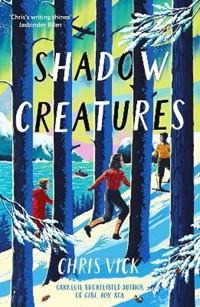Chris Vick


About Author
Chris Vick tells us how his latest novel, Shadow Creatures, was inspired by his family's experiences in Norway during World War II.
Chris is a graduate of the Bath Spa MA in Writing for Young People. In between writing and teaching, Chris works for a whale and dolphin conservation charity and is a member of Authors4Oceans. Chris He lives near Bath with his wife and daughter.
His earlier books include Girl. Boy. Sea., which was shortlisted for the 2020 Carnegie Medal, and The Last Whale (Zephyr).
Chris Vick Website Twitter: @chrisvickwrites Insta: @chrisvick321
Interview
Chris Vick introduces his WWII adventure, Shadow Creatures (Zephyr)
Chris Vick's new novel, Shadow Creatures, explores the impact of the German invasion on a small community in Norway, and the many acts of resistance by its people
Vick tells ReadingZone how he has drawn on his family's stories from World War II and Norwegian myths of the Underjordiske, or 'shadow creatures' to explore life under occupation. Through the stories of two sisters, he examines the moral questions faced by the community, and asks the reader to consider who is right, who is wrong?
Review: "Chris Vick's writing completely captures the place and emotions of the time." Read a Chapter from Shadow Creatures.
Q&A with Chris Vick, introducing Shadow Creatures
"There's lots of books about Britain in the war; lots of evacuees and tea and cake in bomb shelters, and there are books
about 'heroes'. But what about ordinary people living through extraordinary hardships?"
1. Thank you for joining us on ReadingZone. Can you tell us about your new book, Shadow Creatures, and what happens?
Shadow Creatures is an adventure story set in Norway 1940-45, in the snow filled valleys, coastal islands and long winter nights. The Nazis arrive in Liva and Tove's village. Change is slow, but then rules and fear creep in. The children's beloved island, once a place of picnics under the midnight sun, is turned into a grim prisoner-of-war camp.
Taking inspiration from the Underjordiske - the 'hiddens,' the 'shadow creatures' of Norwegian folklore - the sisters court danger, resist and rebel against the Nazis. Friendships are made and broken, trust turned upside down and lives changed forever.
2. The book is set within a small community in Norway. Do you have a connection with Norway and if so, how has this helped develop your knowledge of its history, traditions and folk stories'?
I'm half Norwegian on my Mum's side. So much of the book is from our family's history. One of Mum's earliest memories is of taking food parcels to the POW camps, to feed the starving Russians at the end of the war. Like Haakon in the book, my uncle Sverra delivered underground newssheets in loaves of bread, which could have got him, or my grandfather, killed. There's lots more. It was all too good not to use.
The village and towns aren't based on one real place, but are definitely inspired by places I have visited; the mountains near Dombas, and the fjords and islands near Stavanger.
3. Why did you want to explore what happened to one small community in Norway during WWII? How did you research it?
There's lots of books about Britain in the war; lots of evacuees and tea and cake in bomb shelters, and there are books about ‘heroes.' But what about ordinary people living through extraordinary hardships? What about the hundreds of small - and not-so-small - acts of secret rebellion?
Research was via the web, some books and, as I say, family history. The nature and character of the country, was key, so I'm glad to have had the chance to visit Norway a few times.
4. We don't hear much about Norwegian history; will this story be relevant to those studying WWII in schools in the UK?
Yes, we hear about Britain and the battles but the story for millions of people globally was of occupation under German or Japanese rule. I hope it helps give people a sense of what life was like, and what might have been, if the Nazis had won.
5. Do you feel it's important for today's young people to revisit the past through stories like this?
I don't know who said it, but to understand the present we must study the past. The setting and dates may change, but such stories asks questions that are relevant to all of us, now and in the future. What would we do for freedom, for our families? When is it right to rebel?
How I engage readers is the same as with any book I write; characters we can relate to, who we really care about. At least, that's my hope.
6. Why did you decide to write the book as a dual narrative shared mainly between the sisters Liva and Tove, and how did their voices develop?
I tried a few approaches before settling on this one. It wasn't so much a decision as something that grew orqanically. Liva, following the village tear-way, Agna, is the braver, more reckless sister, prepared to rebel and follow her conscience, even at great risk. Tove is the more sensible one, who simply wants the get the family through the war - whatever the outcome - alive and safe. This gave me interesting tension and dynamics to work with. Which of them is 'right', or is it more complex than that?
Their voices too, grew organically. It was also really important that they both change through the story; that their experiences make them question who they really are. There's some of my mum, and how I imagine she was as a girl, in both of them.
7. You also explore many of the decisions and choices people have to make to survive through Shadow Creatures. What would you like your readers to take from their stories?
That there are not always easy answers about right or wrong, in difficult circumstances; that in the end we all have to follow our own moral compass, even though it is not without risk, or consequence. And also, that uniformity and obedience to a principle, can be dangerous.
8. In your earlier novels, the sea and the environment play a significant role in the stories. Here, the setting and seasons are embedded within the story. Why do you feel these natural landscapes are so important in your writing?
I honestly don't know, it's a good question. It's been said that the sea is like a character in my stories. In Shadow Creatures, maybe it's because the sea and mountains and winters defined how the resistance worked. It made occupation difficult. It also possibly helped form the Norwegian character - if there is such a thing - which was both stubborn and ingrained with Norway's nature.
In the end, I think it's maybe just that the natural world is so important to me, so it has to be in my writing. There is also the seasonal metaphor too, of course: Norway's descent into a dark winter, before spring comes.
9. What was the most challenging part of Shadow Creatures to write?
Showing the clear differences between right and wrong, good and evil, without oversimplifying things, or ignoring the complexities of hard moral choices.
10. How does your writing day go? Is writing a struggle or a pleasure? And what are you writing currently?
A full day is rare, and anyway, I think I write best in lots of shorter concentrated bursts of two to three hours. Life is so busy, I find the only way (and actually the best way) is to wake up early, read something good, have strong coffee, then write. Everything else is secondary and comes later. At one point, when I had a - very - full time job, working this way was the only option. I don't have to work that way now, but if it isn't broken… I write in a spare room, I also have a small converted shed when its warmer, and I love writing in bed, at the kitchen table, in a café, on the beach, a train. Headphones are very useful.
Writing is a pleasure. Like many authors, I wrote for years before being published (and, yes, I have always been an author). I did it - and still do - because I love it. But that doesn't mean it is not a struggle. Sometimes it is very, very difficult indeed.
As to what I am writing now: A modern day, twisted version of The Tempest, set in Cornwall. At the heart of it is a girl, with power over earth, air, fire and water; powers that are at first wondrous, but which slowly become more dangerous and all consuming. It's centred on the question of: What if such powers existed, but were as much a curse as a blessing? What might we be tempted to do with them, and what might they do to us?
The Last Whale (Zephyr, 2022)
Watch Chris Vick introduce his earlier novel, The Last Whale (Zephyr) a powerful exploration of our oceans and what links us to them; a story about one family's move from hunting whales to campaigning for them; and a warning of how bad things could get if we fail these ocean creatures. Read a chapter from The Last Whale.
 Shadow Creatures
Shadow Creatures
 The Last Whale
The Last Whale
 Girl. Boy. Sea.
Girl. Boy. Sea.
